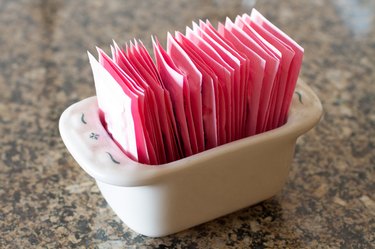
Sodium saccharin, also simply known as saccharin, is a type of zero-calorie artificial sweetener, according to the American Academy of Family Physicians (AAFP). Although it's artificial, it's generally considered safe for us to eat. However, it may cause allergic reactions for some people.
What Is Saccharin?
Video of the Day
Saccharin is 200 to 700 times sweeter than regular table sugar, per the AAFP. Some people also notice that it has a slightly bitter aftertaste, which is why food manufacturers often combine it with other artificial sweeteners such as aspartame.
Video of the Day
Saccharin is found in many processed food products, including chewing gum, canned fruit, baked goods and soft drinks. It can also be used like regular sugar and added to coffee or to homemade baked goods. Ever used a pink packet of Sweet 'N Low or maybe even Sugar Twin? Those are both made of saccharin.
Does Saccharin Cause Cancer?
Research in the 1970s linked saccharin consumption to bladder cancer in rats, according to the Food and Drug Administration (FDA). This prompted Congress to require a warning label on all saccharin products.
However, since then, more than 30 human studies have found that there is no cancer-saccharin link. In 2000, saccharin was taken off the National Institutes of Health's list of potential carcinogens and warning labels were removed from saccharin products.
In short: Saccharin is not linked to cancer and the FDA considers it safe for human consumption.
Read more: 10 Foods That Are Linked to a Higher Cancer Risk
Does Saccharin Raise Blood Sugar?
Because saccharin is a zero-calorie sweetener, it doesn't directly raise blood sugar levels, according to Diabetes.co.uk.
However, research suggests that artificial sweeteners disrupt the gut microbiome, aka the healthy population of bacteria and fungi that live naturally in the digestive tract, according to a February 2019 review published in Advances in Nutrition. Imbalances in the gut microbiome may cause higher average blood sugars in the long term.
Artificial sweeteners have long been touted as sugar alternatives with no negative health effects — an appealing idea given the high levels of sugar in Western diets. But now, taking in artificial sweeteners is linked to an increased risk of type 2 diabetes, obesity, heart disease and high blood pressure — conditions all often related to poor diet.
Eating or drinking foods with high amounts of artificial sweeteners, especially at a young age, can affect the body's sensory processing of sweet tastes, a report published in October 2015 in Appetite found.
Artificial sweeteners are hundreds of times sweeter than regular sugar, so consuming them in large amounts can cause regularly sweet foods to taste less sweet. This can lead to overeating as well as a diminished release of certain hormones such as GLP-1, which are critical in blood sugar regulation. Instead of substituting regular sugar for sweeteners like saccharin, the paper's authors recommend reducing the intake of sweet-tasting foods overall.
Read more: A Detox Plan to Kick Your Sugar Habit for Good
Saccharin Side Effects
Sodium saccharin can cause an allergic reaction for people who also have issues taking sulfa drugs, a certain class of antibiotics, such as Bactrim and Septra, according to the Mayo Clinic.
"For some people, [saccharin] can cause breathing problems, skin irritation, headaches or gastrointestinal issues," Bonnie Taub-Dix, RDN, creator of BetterThanDieting.com and author of Read It Before You Eat It: Taking You from Label to Table, tells LIVESTRONG.com
However, if you're concerned you may have an allergy to this artificial sweetener, Taub-Dix cautions against experimenting on your own at home. Instead, "If you think you have an issue, it's a good idea to get that checked out by a health care provider to get a clarified diagnosis," says Taub-Dix.
How to Avoid Saccharin
If you're concerned about possible saccharin side effects, limit or avoid foods with "saccharin" in the list of ingredients. As mentioned, these will typically include sodas, many candies, baked goods and canned fruits.
It's a good idea to limit these foods anyway, since they typically have little to no nutritional value and are directly linked to obesity, type 2 diabetes and heart disease, according to Harvard Health Publishing.
If you're concerned about the association between sulfa drugs and saccharin side effects, speak with your doctor.
- American College of Family Physicians: "Sugar Substitutes"
- Food and Drug Administration: "Additional Information about High-Intensity Sweeteners Permitted for Use in Food in the United States"
- Diabetes.co.uk: "Saccharin"
- Advances in Nutrition: "Effects of Sweeteners on the Gut Microbiota: A Review of Experimental Studies and Clinical Trials"
- Appetite: "Artificial Sweeteners Are Not the Answer to Childhood Obesity"
- Harvard Health Publishing: "The Sweet Danger of Sugar"
- Mayo Clinic: "Sulfa Allergy: Which Medications Should I Avoid?"